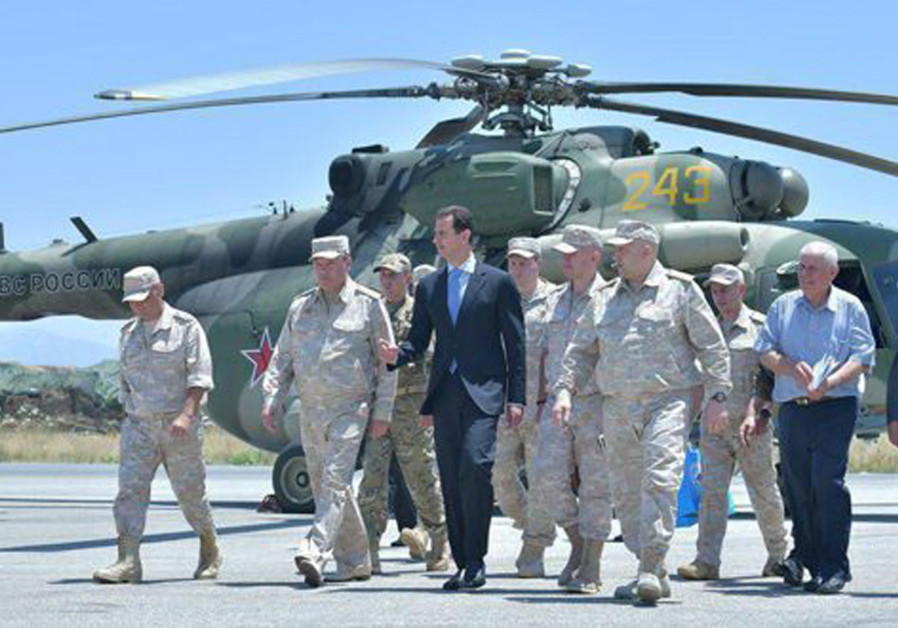In a more perfect universe, at least from Israel’s vantage point, the Americans would be a fourth party around that negotiation table, and, as such, Israel’s interests would be voiced.

Throughout the nearly seven years of civil war that ripped Syria apart, Israel was extremely careful not to take sides.
True, Israel treated Syrians wounded in the fighting. Granted, it took action from time to time against arms depots or convoys it believed were intended for Hezbollah in Lebanon. Yes, it reportedly took some steps to prevent Iran from setting up shop right on the Golan border. But it never took a public side.
Prime Minister Benjamin Netanyahu was always careful not to say that Israel hopes the Syrian rebels would topple Assad, or, conversely, that Assad would remain in power so that Israel would have an address to hold responsible for any action taken against the Jewish state.
Netanyahu and other top officials have said more than once that Jerusalem must not voice an opinion publicly regarding who it wants to win the Syrian war, fearing that such comments would only ricochet against whichever side Israel chose to support.
There was also an additional problem: There were conflicting opinions in Jerusalem about Israel’s preferred outcome.
On the one hand, there were those who said that Israel wants to see Syrian President Bashar Assad toppled because he is an Iran-backed butcher, and Israel’s interest is that someone take control of the country who is not supported by Iran – even if that means rebels affiliated with al-Qaida.
On the other hand, there were those who argued that the devil that Jerusalem knows in Damascus is better than the one it could get if Assad were overthrown.
From the start of the civil war in March of 2011 until the Russians moved in directly to save Assad in September 2015, the standard response given by Israeli officials to the question of what it wants to emerge from the unrest in Syria was that Jerusalem is not involved but has certain redlines that it would enforce.
Those redlines were simple.
They included any efforts by Iran or Syria to move chemical weapons or game-changing weaponry through the war-torn country to Hezbollah or any other terrorist organization.
Following Russia’s direct involvement in the war, and as the tide began shifting in Assad’s favor, Israel remained mum on what it hoped to see emerge in Syria, but drew additional redlines to include any effort by Iran or its Shi’a militias to set up a permanent presence on Israel’s borders. Israel has reportedly taken action to enforce that redline on a couple of occasions.
All questions about what Israel had hoped to emerge after the war seemed, over the years, largely theoretical, as it appeared that no conclusion was in sight.
But now, with Russian President Vladimir Putin hosting Iranian President Hassan Rouhani and Turkish President Recep Tayyip Erdogan in Sochi, an end does appear in sight, and it will likely not be an end that brings cheer to Israel.
Israel has an enormous stake in the determination of the future of Syria. Though a fierce enemy, Syria has kept its border with Israel quiet since the Yom Kippur War in 1973, unlike the situation that has reigned in Lebanon. The presence of Iranian, Hezbollah and Shi’a militias in the country after the civil war could very well alter this situation.
What is taking place right now in Sochi will determine the fate of Syria for decades to come.
What is worrisome from Israel’s point of view is that two of the three leaders determining the fate of the country – Rouhani and Erdogan – are implacably hostile to the Jewish state, while the third, Putin, is definitely not in the same category but also cannot be counted on to necessarily carry Israel’s water.
In a more perfect universe, at least from Israel’s vantage point, the Americans would be a fourth party around that negotiation table, and, as such, Israel’s interests would be voiced.
But America is not there, leaving Putin as this country’s advocate, which is not an enviable situation.
When Israeli historians look back at the legacy that ex-US president Barack Obama left on the Middle East, his failure to act in any significant manner in Syria – especially when he famously backed down from the redline he himself set regarding the use of chemical weapons – will quite possibly be the low point.
This created a vacuum in Syria – a vacuum eagerly and heartily filled by the Russians and Iranians.
With the election of Donald Trump, there was some hope in Israel that he would reverse course and reassert some kind of US presence in the Syria. Those hopes were boosted by Trump’s decision in April to send 59 Tomahawk missiles at an air base, in retaliation for Assad’s use of chemical weapons.
But that was it. Since then, the US under Trump, just as it did under Obama, largely removed its hands from the country and left the playing field wide open for the Russians and Iranians.
And now the fruits are being reaped. Russia, Iran and Turkey are determining the fate of Syria because they have a presence there. As the saying goes, “Those who pay, play.”
The US is not at the table, which is ultimately bad for the US since it marks a significant loss of influence in the region, and is immediately bad for Israel because no one is looking out for its interests in the re-design of Syria.
As reported by The Jerusalem Post
